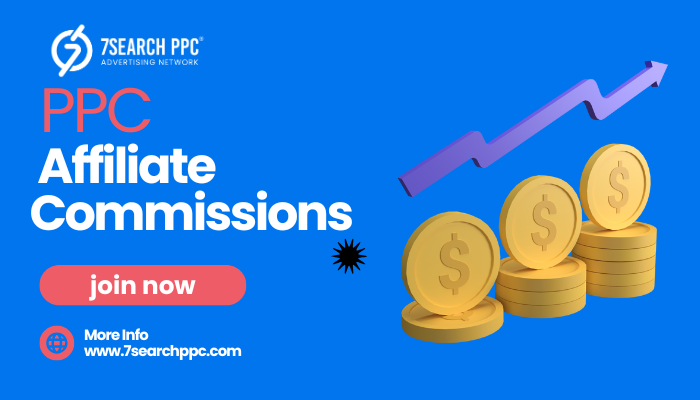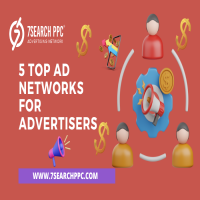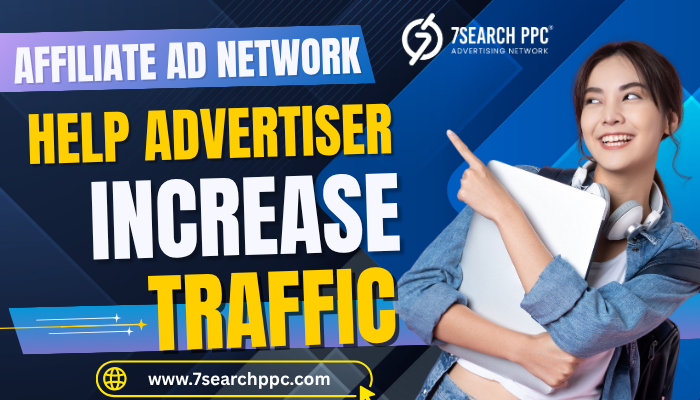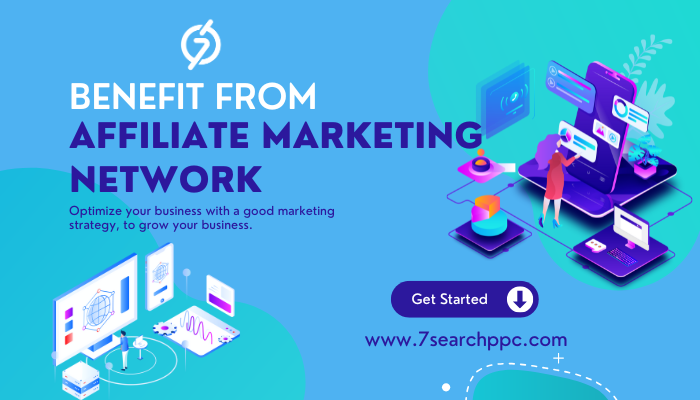The Ultimate Guide to Earning More with PPC Affiliate Commissions

In the world of affiliate marketing, one of the most powerful ways to earn passive income is by leveraging Pay-Per-Click (PPC) advertising in combination with affiliate commissions. By strategically placing ads and targeting the right audience, affiliate marketers can significantly boost their earnings. If you’re looking to maximize your revenue from PPC affiliate commissions, this guide will help you understand how it works, why it’s effective, and the best strategies for success.
What is PPC Affiliate Commission?
Before diving into the strategies, let's first understand what PPC affiliate commissions are.PPC (Pay-Per-Click) is a form of online advertising where advertisers pay each time a user clicks on their ad. As an affiliate marketer, you can create and run PPC ads to promote products or services from affiliate programs. When a user clicks on your ad and completes a desired action—whether it’s making a purchase, signing up for a service, or filling out a form—you earn a commission. The goal is to drive targeted traffic to your affiliate offers and generate conversions.
Affiliate marketing itself is a performance-based business model where marketers promote a merchant’s products or services and earn a commission for every sale or lead generated through their efforts. In the case of PPC affiliate commissions, you’re essentially combining the power of paid advertising with affiliate marketing to drive sales and earn revenue.
Why PPC Affiliate Commissions Work So Well?
Targeted Traffic
One of the primary reasons why PPC affiliate marketing is so effective is its ability to bring in highly targeted traffic. With platforms like Google Ads or Bing Ads, you can target users based on their search intent, interests, location, device, and even demographic data. This helps you reach users who are already interested in your product or niche, increasing the likelihood of conversion.
Instant Results
Unlike organic SEO, which can take months to show results, PPC provides almost instant traffic. As soon as your campaign goes live, your ads start appearing in search results or on display networks. This means you can start seeing affiliate commissions right away, making PPC a great option for those looking to generate quick returns.
Scalability
PPC offers tremendous scalability. Once you have a winning campaign, you can increase your budget and expand your reach. This allows you to grow your affiliate commissions exponentially. As long as your ROI is positive, you can scale up the ad spend without worrying about diminishing returns.
How to Get Started with PPC Affiliate Commissions
Choose the Right Affiliate Marketing Networks
To begin earning through PPC affiliate commissions, you need to partner with the right affiliate marketing networks. These platforms connect affiliates with merchants and offer a wide range of products or services to promote. Some of the most popular affiliate marketing networks include:
- ClickBank
- CJ Affiliate (formerly Commission Junction)
- ShareASale
- Rakuten Marketing
- Amazon Associates (for physical products)
When selecting an affiliate network, ensure that it offers products relevant to your audience, competitive commission rates, and reliable tracking and reporting tools.
Select the Best Affiliate Programs to Promote
After joining an affiliate marketing network, it's time to choose the best affiliate programs. You’ll want to promote offers that align with your niche and resonate with your audience. Some programs may offer a higher commission rate, but others may have a more compelling sales funnel or higher conversion rate. Finding the right balance between commission and conversion potential is crucial.
Popular niches for PPC affiliate marketing include:
- Health and wellness
- Finance and investment
- Technology and software
- E-commerce and fashion
- Online education and courses
Set Up Your PPC Campaign
Once you’ve chosen the affiliate program and product, you can set up your PPC campaign. Here's how to create a campaign that maximizes your affiliate commissions:
Define Your Goals
Before creating your ads, define what success looks like. Do you want to drive sales, generate leads, or promote sign-ups for a free trial? Having clear objectives will help you structure your campaign properly.
Conduct Keyword Research
Keyword research is the foundation of any successful PPC campaign. Use tools like Google Keyword Planner or SEMrush to identify high-converting keywords relevant to your affiliate offers. Focus on long-tail keywords (phrases that are more specific and less competitive) as they tend to have higher conversion rates and lower CPC (Cost-Per-Click).
Create Compelling Ads
Your ads should be compelling enough to entice users to click. Ensure your headline clearly communicates the value proposition of your offer. Use action-oriented language like “Buy Now,” “Get Started,” or “Limited Time Offer” to create urgency.
Optimize Your Landing Page
The landing page is where users land after clicking your ad, so it needs to be optimized for conversions. Ensure that it matches the ad's promise, loads quickly, and has a clear call to action. You may also want to use split testing to find the version of the page that performs the best.
Set a Budget and Monitor Performance
PPC campaigns can quickly become expensive if not monitored closely. Set a daily or lifetime budget, and regularly check your campaign's performance. Optimize your campaigns based on the results to maximize your return on investment (ROI).
Key Affiliate Marketing Strategies for Success
Optimize for Conversion
Traffic alone isn’t enough to guarantee PPC affiliate commissions—you need to focus on conversions. Test different elements of your ads and landing pages, such as:
- Ad copy
- Call-to-action buttons
- Visual elements
- Offers and bonuses
By continually optimizing your campaign based on conversion data, you can improve your ROI and earn more commissions.
Retargeting Ads
Retargeting is a powerful PPC strategy that allows you to target users who have previously visited your website or landing page but didn’t convert. By showing them relevant ads after they’ve left your site, you increase the chances of them returning and completing the desired action.
Focus on Mobile Users
With the rise of mobile internet usage, it’s important to ensure your PPC campaigns are optimized for mobile devices. Make sure your ads, landing pages, and affiliate links are mobile-friendly, and test them across different screen sizes to ensure a seamless user experience.
Leverage Affiliate Marketing Networks for Better Results
Affiliate marketing networks provide valuable resources, including insights into top-performing programs and products. Take advantage of their tools, reports, and affiliate community to stay updated on trends and best practices. Some networks also offer training materials that can help you refine your marketing strategies.
Test Multiple Platforms
While Google Ads and Bing Ads are popular PPC platforms, don’t limit yourself to just one. Other platforms, such as Facebook Ads, Instagram Ads, and YouTube Ads, can also help you reach a different audience. Testing multiple platforms helps diversify your traffic sources and increase your chances of generating commissions.
Best Practices for Maximizing PPC Affiliate Commissions
Track Your ROI
It's essential to closely monitor your PPC campaigns and track your ROI. By using tracking tools like Google Analytics or your affiliate network’s built-in tracking software, you can see which ads, keywords, and landing pages are delivering the best results. Focus your budget on high-performing elements and eliminate underperforming ones.
Use A/B Testing
A/B testing allows you to experiment with different versions of your ads and landing pages to determine which combination leads to the highest conversion rate. Test one variable at a time (like the call-to-action text or the headline) to understand what works best for your audience.
Focus on High-Quality Traffic
Not all traffic is created equal. Focus on bringing in high-quality traffic—users who are genuinely interested in your affiliate offer. Use advanced targeting features on PPC platforms to hone in on your ideal audience, and avoid broad targeting that can lead to wasted ad spend.
Conclusion
PPC affiliate commissions can be a highly effective way to scale your affiliate marketing business. By selecting the right affiliate programs, optimizing your PPC campaigns, and focusing on conversion strategies, you can maximize your earnings and create a sustainable income stream. Remember to track your results, test different strategies, and continuously refine your approach to ensure success. Happy marketing!
Frequently Asked Questions (FAQs)
What is the difference between PPC and other forms of affiliate marketing?
Ans: PPC affiliate marketing differs from other forms of affiliate marketing in that it involves paid ads to drive traffic to your affiliate links, while traditional affiliate marketing methods (like blogging or email marketing) rely more on organic traffic.
How much can I earn from PPC affiliate commissions?
Ans: The amount you can earn depends on factors like your ad spend, the affiliate program’s commission structure, the quality of your traffic, and your conversion rate. Some affiliate marketers can earn hundreds or even thousands of dollars per month through successful PPC campaigns.
What are the best affiliate programs for PPC marketing?
Ans: Some of the best affiliate programs for PPC marketing include Amazon Associates, ClickBank, and CJ Affiliate. These networks offer high-quality products and services that are easy to promote through paid ads.
How do I choose the best affiliate programs to promote with PPC?
Ans: Look for affiliate programs that offer high commissions, proven conversion rates, and products that match your audience's interests. Research and choose programs that provide robust tracking and reporting to help you optimize your PPC campaigns.
Note: IndiBlogHub features both user-submitted and editorial content. We do not verify third-party contributions. Read our Disclaimer and Privacy Policyfor details.







